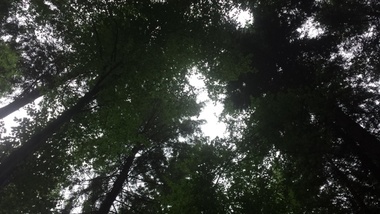
Of course, the intrinsic value of landscape is somewhat abstract. Stone suggests, however, that we have already given concrete power in law to the abstract value of copyright. Why should a piece of text or music be given the kinds of protection guaranteed in copyright law? – we as humans have decided that these creative outputs should have agency within law. Why then can we not give the same agency to the environment?
Clearly a forest can’t come to court and sue a company that’s polluting a river running through it. So Stone suggested nominating some kind of guardian to speak for the forest, much as a lawyer might go to court to speak for a corporation or a government. This notion really chimed with me reflecting on our discussions at the bee workshop where we spoke to the human guardians of bees (i.e. bee keepers) to start our ‘conversation’ with bees, to help us understand their issues and think about ways of co-constructing research agendas with them.
Our two days among the trees brought these issues to mind for me. Are the Forestry Commission / other officially appointed ‘guardians’ of landscape in a position to speak for the trees or do we need some other kind of engagement? As I lay in the forest with my feet in the bare earth (getting midge bites!), I didn’t find an answer to this, but it was soothing and I emerged from the workshop wondering if the main impact of our conversation with the trees was in grounding/lulling a group of busy academics who otherwise lead hectic, stressful lives...
 RSS Feed
RSS Feed
